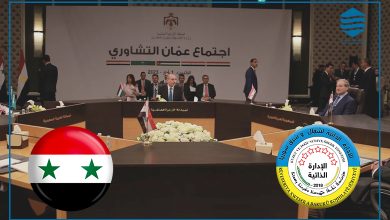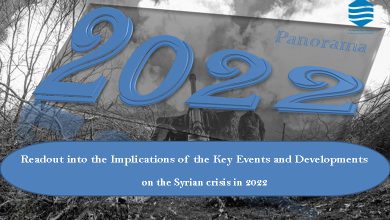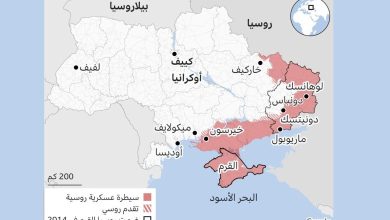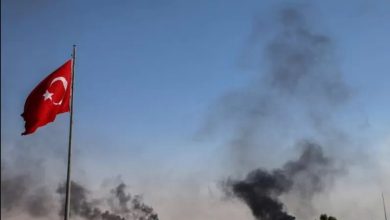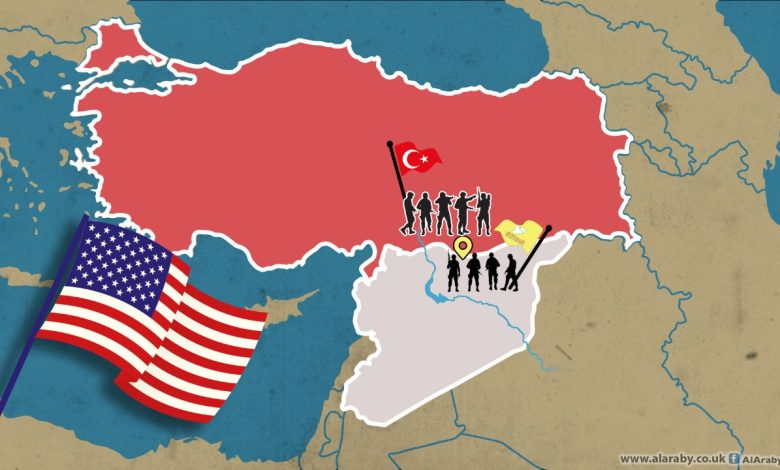
The Real Purpose behind Turkey’s Threats against the East of Euphrates
Turkish President Recep Tayyip Erdogan was angry after his meeting with US President, Joe Biden, on the sidelines of the G20 Summit, which was held in the Malaysian city of Bali, in mid-November. Following their meeting, he made high-pitched statements against two of the US’s vulnerable links in the region, in which he clearly focused in his statements on carrying out a sudden assault on Greece and the East of the Euphrates in Syria.
The meeting, held between the two parties at the request of the Turkish side, was not on President Biden’s agenda.
Was the meeting between the two Presidents fruitless for the Turkish President? What are the Turkish demands that have been rejected or procrastinated that made Erdogan so angry that he did not wait to get back to his country to make his own statements?
Turkey-US relations are clearly in great decline, the starting point of this decline was in 2003, in which the first rift occurred between the two countries when Turkey refused to allow the United States to use its territory to launch attacks against Saddam Hussein’s regime. The relationship between the two sides continued to decline, reaching a peak of its complexity under the President Biden’s administration.
Turkish army’s armament crisis
At this point, Turkey’s primary concern is the armament of its military with sophisticated equipment and weapons, which it considers its main demand, in particular the acquisition of (F16) aircraft. The Biden administration refrains from providing the Turkish army with a new set of these aircraft and modernizing its already existing aircraft fleet. This point would become a serious weakness for the Turkish army at a time when wars are managed through sophisticated weapons and technology. Especially, the data and analysis can be inferred in order to read this phase, indicating that the region might witness heated conflicts phase.
Nevertheless, the most important question here is; why does the Biden administration refrain from providing Turkey with whatever it wants? Even though the armament of the Turkish army is provided by the US since, Turkey is a NATO ally.
It seems clear that refraining from arming the Turkish military with sophisticated weapons is not only limited to the Biden administration, with the United States midterm elections getting close. Turkey – which Erdogan also confirmed in his statements – believed that Turkey’s request for F-16 aircraft will be achieved if the Republican Party wins these elections, but this issue goes beyond the government, and it is a US strategic issue towards Turkey.
What are the reasons behind the US’s adoption of this stance towards Turkey?
Turkey’s justice and development Party (AKP) has practiced, a clear opportunistic policy concerning many important US policy milestones, has not taken into account NATO’s interests in its policies, and Turkey’s constant belief that it has an important geopolitical position that cannot be neglected. Therefore, the American refusal came to strengthen the Turkish army, following Turkey’s attempt to exploit this point. What prompted the United States to deny Turkey this leverage and grant it to Greece instead, i.e. strengthening Greece’s role and its geopolitical position by building large US bases on its lands, at the expense of freezing its bases on Turkish territory, particularly after Turkey purchased the Russian S-400 missile system.
There are, undoubtedly, other reasons why America does not give military technology to Turkey and its removal from the F-35 program. Most notably the creation of a balance between Turkey’s military capabilities and those of the Greek army. Thus, the US clearly does not support Turkey in order to prevent its military superiority against Greece at this point. This is one of the crucial reasons according to the available realities, and this is what Turkey is well aware of, that is why it claims of launching an attack on the East of the Euphrates and exerting maximum pressure on the US’s vulnerable points, aiming at urging the US to fulfill its demands or to invite it to sit at the negotiations table, in order to listen to its demands. However, the US Department of State and the White House did not pay too much attention to this fuss made by Erdogan, leaving the task of responding to the Pentagon, which is not a diplomatic entity, therefore, it is not entitled to make any concessions to Turkey, in order to secure its demands.
The Turkish elections
The (AKP) party faces challenges and obstacles to stay in power for another term, even its election campaign lacks strong foundations. When this party found that no one would give it an opportunity to maneuver, in declaring an “internal peace” process, it went to war option, In order to attract the support of Turkish chauvinists. However, it seems obvious, is that this category is also shrinking. But, the most important thing is that the world’s dominant powers, spearheaded by the United States, do not want the (AKP) party to make any gain in its election campaign, subsequently, strengthens its role as a governing party, this is why we find all this blunder within this party’s foreign policy.
Normalization with the “Syrian” regime
Erdogan’s attempts at normalization with the “Syrian” regime are also likely to be linked to his election campaign. The Turkish interior has largely been disappointed with the presence of Syrian refugees on their territory; therefore, the ruling party tries to attract the Turkish street at this sensitive time of its rule. However, the “Syrian” regime, on the other hand, has related this normalization process to conditions, in which either option is bitter for the Turkish government, or the question remains: Did the “Syrian” regime realize that Erdogan is seeking normalization to prolong his life in power?
The ruling (AKP) Party is Sunni-oriented and is primarily based on a “Sunni” grassroots, perhaps one of the reasons why the “Syrian” regime is unwilling for the (AKP) party to stay in power, and it would consider to postpone the normalization process, in the hope that other parties closer to it (doctrinally) will win the elections, particularly the Turkish People’s Party of Klejdaroglu. Subsequently, He wants to give Kligdaroglu the “honor of normalization”.
If Erdogan could achieve the desired normalization process, under pressure from the Russian and Iranian sides on the “Syrian regime”, it would be a challenge for Western countries and the United States, which had imposed a state of isolation on Damascus.
Turkey’s normalization with the Syrian regime means that it is clearly aligned with the regional alliance that will include Turkey, Syria and Iran. Consequently, such an alliance at this time would be a challenge to the interests of the world’s hegemonic powers, including Israel. Especially, in parallel with plans for launching possible attacks against Iran and the “Jina Amini”’s revolution. Thus, Turkish-Syrian normalization will be in favor of the Kurd’s interest, more than ever, because if this normalization is achieved, it will be met by an alliance in favor of resolving the Kurdish issue.
In conclusion, Turkey’s decision-making is no longer an easy issue for Turkey, and its pressure cards have negatively been reflected on it. When Turkey did not respond to the international will to cease its threats of a ground invasion in the North and East of Syria, we saw how the US representative at the Security Council refused these threats. Turkey is, therefore, well aware of the meaning of discussing this file in the Security Council, as the outcome will not be in its favor.
The European Court’s admission of Mr. Ocalan’s lawsuit, through his lawyer, against Greece would also be the beginning of the admission of his lawsuits against Turkey. Thus, Turkey will not be able to overcome these obstacles easily, as the consequences of this will be more severe than its ground invasion.
……………………………
Al-Furat Center for Studies- Translation Department
